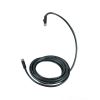Geotech Geosub Pump Controller
Features
- Converts AC Voltage to variable up to 300 watt DC voltage output
- Internal processor saves individual well parameters
- Optional DC to AC Inverter can be connected to avehicle battery
- Free ground shipping
- Expedited repair and warranty service
- Lifetime technical support
- More
Overview
The Gedotech Geosub Controller is designed specifically for use with Geotech's Geosub 2 Stainless Steel Pump. It provides a safe, conditioned variable DC output power from an AC power source. Built-in sensing gives the operator accurate and precise control over the pump during sampling events.
Battery Life
An average 1000-watt gasoline generator with 1 gallon of gasoline will operate the Geosub Controller and Geotech's sampling pump at full power for 18 hours continuously. Generally, much longer run times can be expected as the controller is used to reduce water flow for low-flow sampling.
Design
An easy-to-use programmable user interface with a bright display offers precise control over flow rates during groundwater sampling events. Site-specific settings and conditions can easily be stored and recalled for more efficient, repeatable sampling events. Rugged construction and easy-to-connect cables make setup and portability a breeze. In addition, the controller includes a user-set dry run protection feature.
Benefits
- Converts AC Voltage to variable up to 300-watt DC voltage output
- Short circuit protection for your safety
- Heavy duty rated power cable for years of service
- 2-line x 16-character wide temperature range alpha-numeric digital display
- Push button Up/Down control
- Internal processor saves individual well parameters
- Optional DC to AC Inverter can be connected to a vehicle battery
In The News
Monitoring Aquatic Ecosystems: How Science Drives Waterway Management in Northwest Georgia
The University of Georgia is home to multiple labs that focus on monitoring aquatic ecosystems and organisms across the state. The River Basin Center connects these monitoring efforts with external partners, including government agencies and NGOs, to inform management and restoration of the state’s waterways. Phillip Bumpers is a Postdoctoral Associate in the Rosemond lab and the Wenger lab at the Odum School of Ecology and an affiliate of the River Basin Center. An aquatic ecologist, Bumpers’ research focuses on quantifying how environmental variability shapes aquatic ecosystems and understanding the drivers of these trends.
Read MoreFrom Paddles to Phytoplankton: Studying Vermont’s Wildest Lakes
For six months of the year, Rachel Cray, a third-year PhD student at the Vermont Limnology Laboratory at the University of Vermont, lives between a microscope and her laptop, running data. For the other six months, she is hiking and canoeing four of Vermont’s lakes, collecting bi-weekly water samples. Cray studies algal phenology across four lakes in Vermont, US, that have low anthropogenic stress—or in other words, are very remote. Funded by the National Science Foundation Career Award to Dr. Mindy Morales, the lakes Cray researches part of the Vermont Sentinel Lakes Program, which studies 13 lakes in the area and, in turn, feeds into the Regional Monitoring Network, which operates in the Northeast and Midwest US.
Read MoreReimagining Water Filtration: How Monitoring and Science Enhance FloWater Filtration Systems
Over 50% of Americans think their tap water is unsafe , according to the Environmental Working Group (EWG). Other recent surveys have found that number to be as high as 70% of persons surveyed. Whether due to increased public awareness of water quality issues or confusion about how municipal water sources are regulated, there is a clear distrust of tap water in the United States. According to industry expert Rich Razgaitis, CEO and co-founder of the water purification company FloWater, this issue creates a damaging cycle. Razgaitis explained that the health and environmental problems associated with contaminated water aren’t the only issues. As people become increasingly aware that some tap water is unsafe, they resort to bottled water.
Read More















